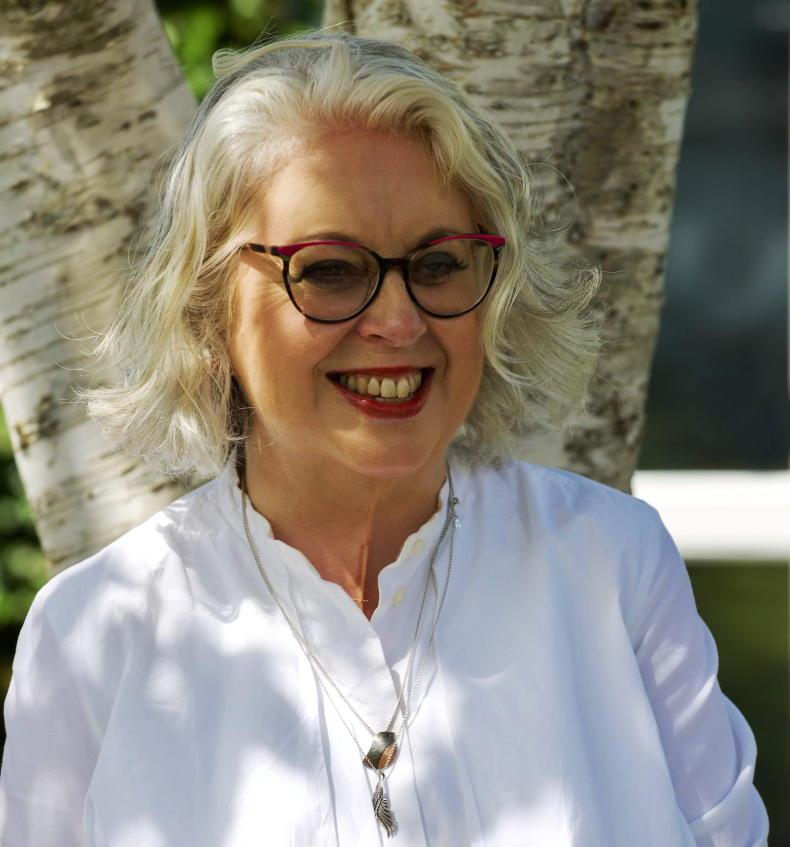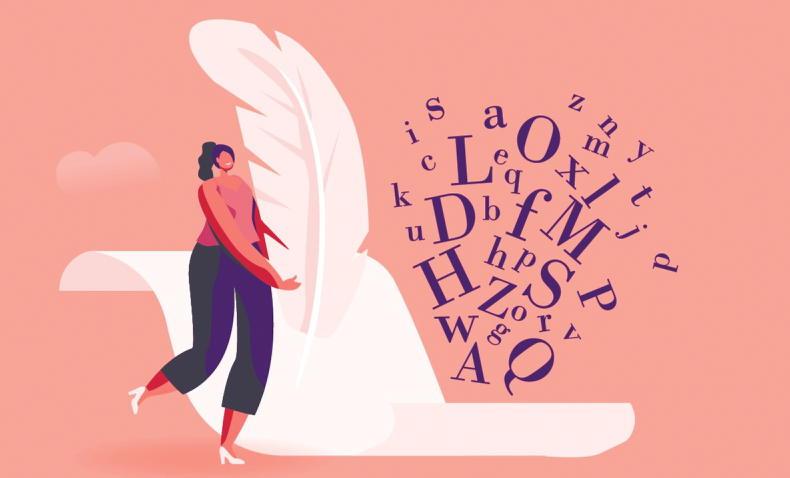“You should write a book!” Has anybody ever told you that? Did you laugh the idea off; or tuck it away somewhere deep inside?
Have you ever thought that you should really scribble down those old family stories before they are lost forever? Revisit your childhood memories? Or simply record the history of your farm for future generations?
If so, over the coming months, Irish Country Living will be teaming up with memoir-writing mentor and poet Maureen Boyle to guide and inspire you to take the first steps in writing your own story; whether you have dreams of publishing a best-seller, or simply want to produce your own personal record for posterity.
Finding her voice
Of course, there are few things as daunting as facing a blank page; and this is a challenge that Maureen understands only too well.
Originally from Sion Mills in Co Tyrone, she started writing poetry when she was just six and even won a UNESCO medal for a book of poems when she was 18; but while studying at Trinity, lost confidence in her own voice.
“Because you were treating things so critically [in academia], it stopped my own creativity,” she explains. “I stopped writing for years.”
Still wanting to pursue a career connected with literature, Maureen worked in libraries and bookshops and eventually went into teaching, becoming head of the English department at St Dominic’s Grammar School in Belfast.
Turning 40, however, saw her return to her first passion.

Poet, creative writing teacher and memoir mentor, Maureen Boyle. \ Lindsay Allen
“I thought, ‘Look, if you don’t do this now, it’s not going to happen,’” says Maureen. “But in some ways, I don’t regret that, because I think it’s that thing that they say: that actually you need a wee bit of life as well to write.”
But she had support along the way. For instance, the opportunity to attend a summer school for teachers run by The Pushkin Trust – a charity dedicated to creative learning – was the gentle shove she initially needed to dip her toe back in the water.
“That’s where I wrote my first poems again as an adult,” says Maureen, explaining that this eventually led her to build up a portfolio to apply to Queen’s University to do a part-time master’s in creative writing.
Since taking that literary leap of faith, Maureen has published three collections: The Work of a Winter, Strabane and, most recently, The Last Spring of the World – with numerous accolades along the way, including the Irish Chair of Poetry Prize in 2007 and the Fish Short Memoir Prize in 2013.
While Maureen writes about many themes in her own work – from ecology to history – she also draws on her own life for source material. In her current collection, for instance: “Luscus” reflects on a traumatic childhood accident that led to the loss of her eye, “Bypass” captures a time period when her father had to travel to the UK for a heart operation, while “First Time” details a college romance.
Ordinary but extraordinary
She has also continued her role in education, however, and having taught creative writing through the Open University for 10 years, is currently with the Irish Writers’ Centre and Queen’s University.
One of the courses that she teaches with the Irish Writers’ Centre is an online class called “Writing your one wild and precious life”. She believes that people are finally starting to realise the value of their own lived experiences.
“There was an idea for a while, ‘Oh my life is so ordinary, what would I have to say?’ The idea that it was only celebrities who would have anything to say,” observes Maureen. “Most people have stories that are worth capturing and telling.”
Maureen believes that rural life in particular offers fertile ground for memoir; whether it’s recording farm history, field names or traditions long gone to tensions that might still simmer today. Indeed, there are many examples of Irish writers – from Seamus Heaney and Patrick Kavanagh to Alice Taylor – who have drawn from their own rural backgrounds in their work.
She also understands, however, that it can be overwhelming to know where to start, so with this new series with Irish Country Living, she will guide would-be writers on how to access memory using a variety of triggers and writing techniques; for instance, using a special photograph as a prompt to start writing, which will naturally lead to other memories emerging.
“That’s the wonderful thing about memoir; that once you start to write, other things come back,” says Maureen.
“Even if you just have someone to describe their farm to begin with … inevitably in doing that, they’ll start to think of connections and people that were associated with it.”
Writers will have the opportunity to send their stories/excerpts to Irish Country Living with a view to publication, but readers are also encouraged to write for themselves for fun or to explore their creative side as a new hobby for 2023.
The important thing to remember is that you have a voice, you have a story; and it’s worth telling.
“This is the magic of this particular form; I just think intrinsically that people are interesting and people’s lives are interesting,” says Maureen.
“It’s your powers of observation, it’s your powers of listening, it’s your powers of memory; and simply telling your own story is a very powerful thing.”
Read more
From agriculture to aristocracy, meet the "accidental duchess"
'I was so lucky to survive... I just knew I had to write this book.'
“You should write a book!” Has anybody ever told you that? Did you laugh the idea off; or tuck it away somewhere deep inside?
Have you ever thought that you should really scribble down those old family stories before they are lost forever? Revisit your childhood memories? Or simply record the history of your farm for future generations?
If so, over the coming months, Irish Country Living will be teaming up with memoir-writing mentor and poet Maureen Boyle to guide and inspire you to take the first steps in writing your own story; whether you have dreams of publishing a best-seller, or simply want to produce your own personal record for posterity.
Finding her voice
Of course, there are few things as daunting as facing a blank page; and this is a challenge that Maureen understands only too well.
Originally from Sion Mills in Co Tyrone, she started writing poetry when she was just six and even won a UNESCO medal for a book of poems when she was 18; but while studying at Trinity, lost confidence in her own voice.
“Because you were treating things so critically [in academia], it stopped my own creativity,” she explains. “I stopped writing for years.”
Still wanting to pursue a career connected with literature, Maureen worked in libraries and bookshops and eventually went into teaching, becoming head of the English department at St Dominic’s Grammar School in Belfast.
Turning 40, however, saw her return to her first passion.

Poet, creative writing teacher and memoir mentor, Maureen Boyle. \ Lindsay Allen
“I thought, ‘Look, if you don’t do this now, it’s not going to happen,’” says Maureen. “But in some ways, I don’t regret that, because I think it’s that thing that they say: that actually you need a wee bit of life as well to write.”
But she had support along the way. For instance, the opportunity to attend a summer school for teachers run by The Pushkin Trust – a charity dedicated to creative learning – was the gentle shove she initially needed to dip her toe back in the water.
“That’s where I wrote my first poems again as an adult,” says Maureen, explaining that this eventually led her to build up a portfolio to apply to Queen’s University to do a part-time master’s in creative writing.
Since taking that literary leap of faith, Maureen has published three collections: The Work of a Winter, Strabane and, most recently, The Last Spring of the World – with numerous accolades along the way, including the Irish Chair of Poetry Prize in 2007 and the Fish Short Memoir Prize in 2013.
While Maureen writes about many themes in her own work – from ecology to history – she also draws on her own life for source material. In her current collection, for instance: “Luscus” reflects on a traumatic childhood accident that led to the loss of her eye, “Bypass” captures a time period when her father had to travel to the UK for a heart operation, while “First Time” details a college romance.
Ordinary but extraordinary
She has also continued her role in education, however, and having taught creative writing through the Open University for 10 years, is currently with the Irish Writers’ Centre and Queen’s University.
One of the courses that she teaches with the Irish Writers’ Centre is an online class called “Writing your one wild and precious life”. She believes that people are finally starting to realise the value of their own lived experiences.
“There was an idea for a while, ‘Oh my life is so ordinary, what would I have to say?’ The idea that it was only celebrities who would have anything to say,” observes Maureen. “Most people have stories that are worth capturing and telling.”
Maureen believes that rural life in particular offers fertile ground for memoir; whether it’s recording farm history, field names or traditions long gone to tensions that might still simmer today. Indeed, there are many examples of Irish writers – from Seamus Heaney and Patrick Kavanagh to Alice Taylor – who have drawn from their own rural backgrounds in their work.
She also understands, however, that it can be overwhelming to know where to start, so with this new series with Irish Country Living, she will guide would-be writers on how to access memory using a variety of triggers and writing techniques; for instance, using a special photograph as a prompt to start writing, which will naturally lead to other memories emerging.
“That’s the wonderful thing about memoir; that once you start to write, other things come back,” says Maureen.
“Even if you just have someone to describe their farm to begin with … inevitably in doing that, they’ll start to think of connections and people that were associated with it.”
Writers will have the opportunity to send their stories/excerpts to Irish Country Living with a view to publication, but readers are also encouraged to write for themselves for fun or to explore their creative side as a new hobby for 2023.
The important thing to remember is that you have a voice, you have a story; and it’s worth telling.
“This is the magic of this particular form; I just think intrinsically that people are interesting and people’s lives are interesting,” says Maureen.
“It’s your powers of observation, it’s your powers of listening, it’s your powers of memory; and simply telling your own story is a very powerful thing.”
Read more
From agriculture to aristocracy, meet the "accidental duchess"
'I was so lucky to survive... I just knew I had to write this book.'







 This is a subscriber-only article
This is a subscriber-only article










SHARING OPTIONS: